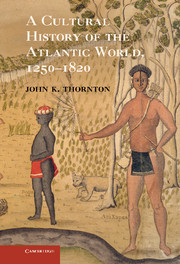Book contents
- Frontmatter
- Contents
- Figures
- Maps
- Preface
- Abbreviations
- Introduction
- Part I The Atlantic Background
- Part II Three Atlantic Worlds
- 2 The European Background
- 3 The African Background
- 4 The American World, 1450–1700
- Part III The Nature of Encounter and its Aftermath
- Part IV Culture Transition and Change
- Index
- References
4 - The American World, 1450–1700
Published online by Cambridge University Press: 05 November 2012
- Frontmatter
- Contents
- Figures
- Maps
- Preface
- Abbreviations
- Introduction
- Part I The Atlantic Background
- Part II Three Atlantic Worlds
- 2 The European Background
- 3 The African Background
- 4 The American World, 1450–1700
- Part III The Nature of Encounter and its Aftermath
- Part IV Culture Transition and Change
- Index
- References
Summary
The indigenous societies of the Americas had a wide – indeed, bewildering – variety of social organizations. This great variety included everything from societies organized on a very small scale, with very little social differentiation and highly democratic decision making, to vast empires ruling millions of people under the tight supervision of a controlled bureaucracy. Precisely how the Europeans interacted with Americans, their ability to shape relationships and to settle, was directly dependent on the type and structure of these Native American societies. Indeed, the fundamental structure of the resulting American societies was determined in large measure by the social structure of the indigenous people at the time of European arrival.
One great divide separates American societies according to their political organization. This divide separates a type of polity I am calling an egalitarian democracy or a free association, where there is not a formal state organization and no permanent social classes, and a type of polity that has both hierarchical state structures and social classes. Among the latter, I have made a second division separating those with small-scale and often fairly weak levels of authority and socioeconomic differentiation, which I am calling mini-states (often called chiefdoms in anthropological literature), and those I call imperial states, which were larger, more complex, highly integrated, and often very inegalitarian in both political organization and division of wealth. This scheme is heuristic, and the division between categories is often quite blurred in reality. In fact, if one takes size and level of authority alone, there are many subgradations among them.
- Type
- Chapter
- Information
- A Cultural History of the Atlantic World, 1250–1820 , pp. 100 - 156Publisher: Cambridge University PressPrint publication year: 2012



